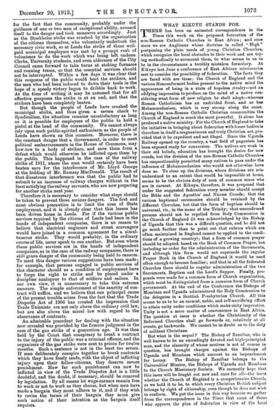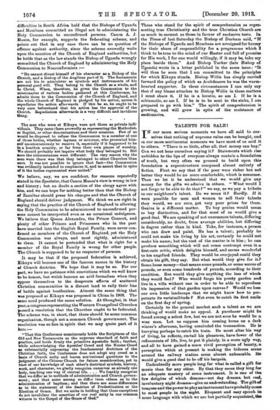WHAT KIKUYU STANDS FOR.
THERE has been an animated correspondence in the Times this week on the proposed federation of the non-Roman Catholic Churches in East Africa ; and once more we see Anglicans whose doctrine is called " High " postponing the plain needs of young Christian Churches, which recognize the local obstacles to their work and are try- ing methodically to surmount them, to what seems to ua to be in the circumstances a terribly mistaken formulary. At Kikuyu last June a conference of East African missionaries met to consider the possibility of federation. The facts they are faced with are these: the Church of England and the various Nonconformist bodies present to the native mind the appearance of being in a state of hopeless rivalry—not an edifying impression to produce on the mind of a native con- sidering what form of new religion be shall adopt—whereas Roman Catholicism has an undivided front, and so has Mohammedanism, which is very strong along the coast. Among the non-Roman Catholic Christian communities the Chureb of England is much the most powerful It alone has produced a native ministry. For the Church of England to take the initiative in bringing about federation with lesser bodies is therefore in itself a magnanimous and truly Christian act, pro- vided that it be expedient and not illegal. Since the Uganda Railway opened up the country, a vast field of paganism has been exposed ready for conversion. The natives are weak in their old beliefs, education has brought the desire for new creeds, but the division of the non-Roman Catholic Churches has unquestionably permitted many natives to pass under the influence of Mohammedanism who would not otherwise have done so. To close up the divisions, where divisions are mis- understood to an extent that would be impossible at home, seems to be the obvious duty of men of common sense who are in earnest. At Kikuyu, therefore, it was proposed that under the suggested federation every member should accept the Bible and the Apostles' and Nicene Creeds ; that the various baptismal ceremonies should be retained by the different Churches, but that the form of baptism should be universal, viz., in the name of the Trinity; that unconfirmed persons should not be repelled from Holy Communion in the Church of England (it was acknowledged by the Bishop of Uganda that this was a difficult question, and he did not go much further than to point out that rubrics which are often maintained in England cannot be applied to the condi- tions of a growing country); that a form of common prayer should be adopted, based on the Book of Common Prayer, but including no order for the administration of the Sacraments, and although this form would not supersede the regular Prayer Book in the Church of England it would be used often enough to become familiar; and that in all the federated Churches there should be regular administration of the two Sacraments, Baptism and the Lord's Supper. Finally, pro- posals were made for a common form of Church organization, which must be distinguished from a common form of Church government. At the end of the Conference the Bishops of Mombasa and Uganda administered the Holy Communion to the delegates in a Scottish Presbyterian Church. All this seems to us to be an earnest, noble, and self-sacrificing effort to attain unity under conditions which make unity imperative. Unity is not a mere matter of convenience in East Africa. The question at issue is whether the Christianity of the Reformed Churches shall go forwards or, relatively at all events, go backwards. We cannot be in doubt as to the duty of militant Christians.
But what is the sequel ? The Bishop of Zanzibar, who is well known to be an exceedingly devoted and high-principled man, and the sincerity of whose motives is not of course in question, has brought charges against the Bishops of Uganda and Mombasa which amount to an impeachment
for heresy. The Bishop of Zanzibar belongs to the Universities' Mission, the Bishops of Uganda and Mombasa to the Church Missionary Society. We earnestly hope that this issue will be fought out now and once for all—the issue whether the Church of Engllnd is a comprehensive Church, as we hold it to be, to which every Christian British subject belongs by right of citizenship, even though he does not wish to conform. We put the issue in this way because we gather from the correspondence in the Times that some of those who approve the plan of federation in view of the local difficulties in South Africa hold that the Bishops of Uganda and Mombasa committed an illegal act in administering the Holy Communion to unconfirmed persons. Canon A. J. Mason, for example, supports the federating scheme, and points out that in any case there can be no question of offence against authority, since the scheme avowedly waits upon the sanction of the Church of England authorities, but he holds that as the law stands the Bishop of Uganda wrongly committed the Church of England by administering the Holy Communion to Nonconformists :— "He cannot divest himself of his character as a Bishop of the Church, and a Bishop of the Anglican part of it. The Sacraments are not his to administer as symbols and instruments of his personal good will. They belong to the Church as a whole, and to Christ. When, therefore, he gives the Communion to the missionaries of various bodies gathered at this Conference, he admits them to the Communion of the Church of England, and the whole Church of England is pledged by his action, unless it repudiates the action afterwards. If this be so, he ought to be very sure beforehand that his action has the approval of the Church. Repudiation afterwards is a very difficult and invidious thing.
•
The men who were at Kikuyu were not there as private indi- viduals. They came there avowedly as representing the Methodist, or Baptist, or other denominations and their missions. Few of us would be disposed to refuse the Communion to a member of one of those bodies, whether layman or minister, who presented him- self unostentatiously to receive it, especially if it happened to be in a heathen country, or far from their own places of worship. We should probably not inquire what body they belonged to. But here the circumstances were different. The very reason why tho men were there was that they belonged to other Churches than ours. It was not possible to ignore that fact—the Communion was evidently intended to emphasize it, and to assert that in spite of it the bodies represented were united."
We believe, nay, we are confident, for reasons repeatedly stated in the Spectator, that Canon Mason's view is wrong in law and history ; but no doubt a section of the clergy agree with him, and we can hope for nothing better than that the Bishop of Zanzibar should press his charges and that the Church of England should deliver judgment. We think we are right in saying that the practice of the Church of England in allowing the Holy Communion to be administered to unconfirmed per- sons cannot be interpreted even as an occasional indulgence. We believe that Queen Alexandra, the Prince Consort, and plenty of other Princes and Princesses who in the past have married into the English Royal Family, were never con- firmed as members of the Church of England, yet the Holy Communion was always, and most rightly, administered to them. It cannot be pretended that what is right for a member of the Royal Family is wrong for other people. The Church is supposed to be no respecter of persons.
It may be that if the proposed federation is achieved, Kikuyu will become one of the famous names in the history of Church doctrine. We hope that it may be so. For our part, we have no patience with convictions which we well know to be honest, but which become an arid formalism when they oppose themselves to the desperate efforts of scattered Christian communities in a distant land to rally their line of battle against heathenism. Almost the same thing that was proposed at Kikuyu was proposed in China in 1908. The same need produced the same solution. At Shanghai, in that year, a congress representing the Western Evangelical Churches passed a resolution that the Churches ought to be federated. The scheme was, in short, that there should be some common organization, though not a common Church government. The resolution was so fine in spirit that we may quote part of it here :—
"That this Conference unanimously holds the Scriptures of the Old and New Testaments as the supreme standard of faith and practice, and holds firmly the primitive Apostolic faith ; further, while acknowledging the Apostles' Creed and the Nicene Creed as substantially expressing the fundamental doctrines of the Christian faith, the Conference does not adopt any creed as a basis of Church unity and leaves confessional questions to the judgment of the Chinese Church for future consideration, yet in view of our knowledge of each other's doctrinal symbols, history, work, and character, we gladly recognize ourselves as already one body, teaching one way of eternal life. . . . We frankly recognize that we differ as to methods of administration and Church govern- ment ; and that some among us differ trom others as to the administration of baptism ; and that there are some differences as to the statement of the doctrine of Predestination or the Election of Grace. But we unite in holding that these exceptions do not invalidate the assertion of our real unity in our common witness to the Gospel of the Grace of God."
Those who stand for the spirit of comprehension as repre- senting true Christianity and the true Christian Church are as much in earnest as those in favour of exclusive tests. In the Times of last Saturday the Bishop of Durham said, "If the Bishops of Uganda and Mombasa are arraigned for heresy for their share of responsibility for a programme which I think to be true to the mind of our Master and full of promise for His work, I for one would willingly, if it may be, take my place beside them." And Bishop Tucker (late Bishop of Uganda) wrote in a letter published in the same issue : "It will thus be seen that I am committed to the principles for which Kikuyu stands. Bishop Willie has simply carried forward the policy of which as Archdeacon he was the warm- hearted supporter. In these circumstances I can only say that if any blame attaches to Bishop Willis in these matters I must share it. If he is a heretic, so am I. if he is a schismatic, so am I. If he is to be sent to the stake, I am prepared to go with him." The spirit of comprehension is growing, and will grow in spite of the resistance of sectionaries.











































 Previous page
Previous page